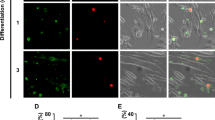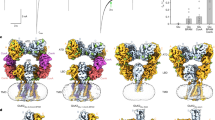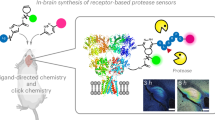Abstract
Our preliminary results1 with a single concentration (10−4 M) of L-glutamate suggested that a glutamate receptor-gated channel (glutamate channel) in locust extrajunctional muscle membrane could suddenly change its kinetic properties and switch from a short to a long lifetime mode. These results were obtained from denervated muscle2 pretreated with the lectin concanavalin A3,4 (Con A) to block glutamate receptor desensitization. We have since extended our patch clamp studies of locust muscle to cover a range of glutamate concentrations and to include innervated muscle and muscle which has not been treated with Con A. These new studies show that the lifetime of the glutamate channel depends on the concentration of glutamate in the patch electrode, which we explain by a multi-binding site receptor model. This model, and our finding that channel openings occur non-randomly, also accounts for the apparent transitions in channel lifetime described in our earlier publication.
This is a preview of subscription content, access via your institution
Access options
Subscribe to this journal
Receive 51 print issues and online access
$199.00 per year
only $3.90 per issue
Buy this article
- Purchase on SpringerLink
- Instant access to full article PDF
Prices may be subject to local taxes which are calculated during checkout
Similar content being viewed by others
References
Patlak, J. B., Gration, K. A. F. & Usherwood, P. N. R. Nature 278, 643–645 (1979).
Usherwood, P. N. R. Nature 223, 411–413 (1969).
Mathers, D. A. & Usherwood, P. N. R. Nature 259, 409–411 (1976).
Mathers, D. A. & Usherwood, P. N. R. Comp. Biochem. Physiol. 59 C, 151–155 (1978).
Neher, E., Sakmann, B. & Steinbach, J. H. Pflügers Arch. ges. Physiol. 375, 219–228 (1978).
Usherwood, P. N. R., Clark, R. B., Gration, K. A. F., Ozeki, M. & Patlak, J. J. Physiol., Paris 75, 615–621 (1979).
Clark, R. B., Gration, K. A. F. & Usherwood, P. N. R. J. Physiol., Lond. 301, 60P–61P (1979).
Gration, K. A. F. Neurotox. 1979 Symp. Soc. Chem. Ind., 169–179 (1980).
Gration, K. A. F., Lambert, J. J. & Usherwood, P. N. R. Proc. 14th int. Physiol. Soc. Budapest (in the press).
Usherwood, P. N. R. INSERM Symp. 13, 367–383 (1980).
Hubbard, J. I., Llinas, R. & Quastel, D. M. J. Electrophysiological Analysis of Synoptic Transmission (Arnold, London, 1969).
Usherwood, P. N. R. J. Physiol., Lond. 227, 527–551 (1972).
Nelson, N., Anholt, R., Linstrom, J. & Montal, M. Proc. natn. Acad. Sci. U.S.A. 77, 3057–3061 (1980).
Schindler, H. & Quast, U. Proc. natn. Acad. Sci. U.S.A. 77, 3052–3056 (1980).
Gration, K. A. F., Lambert, J. J. & Usherwood, P. N. R. J. Physiol., Lond. 310, 49P (1980).
Author information
Authors and Affiliations
Rights and permissions
About this article
Cite this article
Gration, K., Lambert, J., Ramsey, R. et al. Non-random openings and concentration-dependent lifetimes of glutamate-gated channels in muscle membrane. Nature 291, 423–425 (1981). https://doi.org/10.1038/291423a0
Received:
Accepted:
Issue date:
DOI: https://doi.org/10.1038/291423a0
This article is cited by
-
Single glutamate-gated synaptic channels at the crayfish neuromuscular junction
Pflügers Archiv European Journal of Physiology (1987)
-
Single glutamate-gated synaptic channels at the crayfish neuromuscular junction
Pflügers Archiv European Journal of Physiology (1987)



